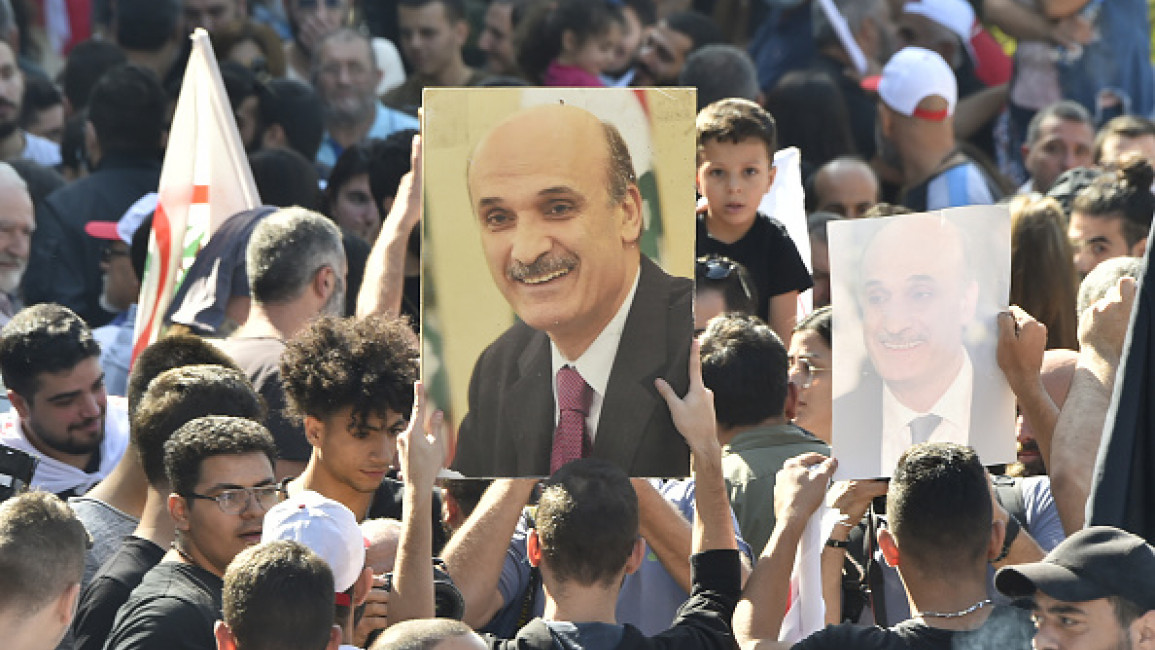Lebanese Forces launch campaign as Lebanese elections approach
The Lebanese Forces, a Maronite political party and former Lebanese civil war militia, kicked off its electoral campaign on Monday as Lebanon's 15 May elections day approaches.
Supporters gathered in the party headquarters in Maarab, just outside Lebanon's capital city, to hear Lebanese Forces (LF) head Samir Geagea deliver remarks to launch the campaign.
Neither the number of candidates nor its policy platform has been decided yet, a party spokesperson told The New Arab, but candidates would be running in the majority of electoral districts.
The LF joins several other political parties whose election campaigns are already underway. The Amal movement, the Iranian-backed Hezbollah's political bloc and the Free Patriotic Movement (FPM), have also all announced their electoral lists.
LF chief Geagea told a crowd of supporters, "We do not have elections, we have a battle to save Lebanon from militias and the mafia." He further promised to deliver accountability to the victims of the Beirut port blast and deliver an end to the corruption which has plagued Lebanon for decades.
Lebanon's 15 May elections will be the first since the October 2019 revolution, when millions demonstrated across Lebanon in protest of rampant corruption. Since the revolution, living conditions in the country have drastically deteriorated, with over two-thirds of Lebanese thrust into poverty and hyperinflation making basic goods unaffordable.
The elections are largely seen as a referendum on Lebanon's traditional parties, who have held power for decades and were the main targets of the 2019 revolution.
The LF has claimed to be a part of that revolution and has adopted many of its slogans.
The party is a traditional part of Lebanon's political system and emerged out of a sectarian, civil-war militia, similar to most other ruling establishment parties in the country.
Its main political rival is the country's most powerful Maronite Christian party, the Free Patriotic Movement (FPM). The FPM is led by Gebran Bassil, former Foreign Minister and son-in-law of Lebanese President Michel Aoun.
The FPM has earned a reputation for corruption in recent years, with its leader, Bassil, repeatedly coming under fire during media appearances for his lavish lifestyle.
The LF has positioned itself as an anti-corruption alternative to FPM, and has taken a hard line against establishment parties – in particular Hezbollah, which it described as an "Iranian occupation." FPM has long had a power-sharing agreement with Hezbollah, providing the LF with much rhetorical fodder.
Lebanese opposition – which largely lies outside of Lebanon's traditional power structure – generally views the LF and most other established parties with suspicion. Most independent parties characterise these traditional parties as colluding partners on the corruption plaguing Lebanese governance.
"Though we are mostly Christian as Lebanese Forces, we are open to all communities. We are looking to build a Lebanese state apart from these sectarian divisions," Richard Kouyoumjian, the former Minister of Social Affairs and head of Foreign Affairs for the LF, told The New Arab.


![Security forces reportedly attacked Egyptian protesters outside the UN Women's Office in Cairo. [Facebook]](/sites/default/files/styles/image_330x185/public/2024-04/Facebook.jpg?h=dec22bcf&itok=X6dF46EV)
